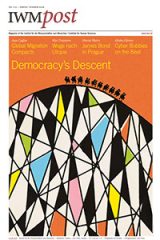

In collaboration with
Institute for Human Sciences
The Institute for Human Sciences / Institut für die Wissenschaften vom Menschen (IWM) is an independent institute for advanced study in the humanities and social sciences. Since its foundation in 1982, it has hosted more than 1500 scholars, journalists and translators from all over the world. Many of the Institute’s Permanent and Visiting Fellows are regular contributors to Eurozine or its focal points Eurasia in Global Dialogue and Ukraine in European Dialogue (see below).
Website: www.iwm.at
Twitter: @IWM_Vienna
Youtube: IWMVienna

Articles
From electoral success to revolutionary failure
The Ukrainian Svoboda party
The radical rightwing party Svoboda rose to prominence in Ukraine’s 2012 parliamentary elections as an alternative to the political establishment, writes Anton Shekhovtsov, expert on Ukrainian rightwing groups. But its role in Euromaidan may well amount to Svoboda’s swan song.
Both your houses
Protest and opposition in Russia and Ukraine
There is one central similarity between Euromaidan and other recent movements across the world: protesters’ self-reliance and distrust of politicians who pretend to represent them is what gives their movement its democratic credentials, but it is also a weakness.
Almost overnight, Ukraine ceased to be a “kingdom in the middle”. Now there are only three options left, writes Ivan Krastev: sign the agreement with the EU, as the majority of Ukrainians want; join Putin’s Eurasia, as the endangered political elite desire; or go bankrupt.
Euromaidan and beyond
Preliminary conclusions
Euromaidan is not just about failing to sign the Association Agreement, but Ukraine’s whole development as a country. For 22 years, it has been stuck in a grey zone between post-Soviet autocracies to the east and increasingly democratizing and prosperous neighbours to the west, writes Mykola Riabchuk.
Focal points

Inspired by a lecture that Clifford Geertz delivered in 1995 at the Institute for Human Sciences in Vienna, this focal point engages with ‘deep diversity’, ‘a sense of dispersion, of particularity, of complexity and of uncenteredness’ rather than unified world order. It follows the launch of a research programme of the same name at the institute in January 2023.

Post-revolutionary Ukrainian society displays a unique mix of hope, enthusiasm, social creativity, collective trauma of war, radicalism and disillusionment. With the Maidan becoming history, the focal point ‘Ukraine in European Dialogue’ explores the new challenges facing the young democracy, its place in Europe, and the lessons it might offer for the future of the European project.
Projects and publications

